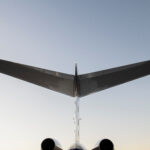Norwich Airport is working with the government to explore how it can make more effective use of the Apprenticeship Levy, with a particular focus on air traffic control apprenticeships.
Speaking to FINN as National Apprenticeship Week got underway, Richard Pace, managing director at Norwich Airport, said: “As part of the Regional and City Airports group we have a good working relationship with Government and have been working with officials on how to make more effective use of the Apprenticeship Levy in respect of the aviation industry, and in particular the provision of air traffic control apprenticeships.”
The apprenticeship levy is paid by large employers with a pay bill of over £3 million. Currently, only 2% of employers pay the levy, which is set at a rate of 0.5% of their total annual pay bill.
Every employer who pays the levy has a digital account where they can access their levy funds to spend on apprenticeship training.
While only the biggest businesses pay the levy, the funding generated by it also funds apprenticeship training for other employers who want to take on apprentices.
Aviation apprenticeships are an important way into the industry for many school leavers. This pathway suits those who prefer a more hands-on, work while you learn, approach.
Norwich Airport growth
Norwich Airport has marked a series of positive announcements in recent months as it builds back strongly from Covid.
Ryanair announced in December that it would begin operations at Norwich Airport for the first time ever this summer, with three new routes – Alicante, Faro, and Malta – commencing from 1st April 2024.
Norwich will become Ryanair’s 22nd UK airport.
Pace added: “Like many regional airports we always ramp up for the summer and this year we’ll be supplementing our 220 or so staff with between 25 and 30 extra seasonal posts.
“We actually started the recruitment process earlier this year because from 1st April we have Ryanair flying for the first time from Norwich with three brand new routes.
“That’s been a catalyst to start our seasonal drive sooner because we will have up to 60,000 extra passengers, so it’s going very well for 2024.”
Subscribe to the FINN weekly newsletter

